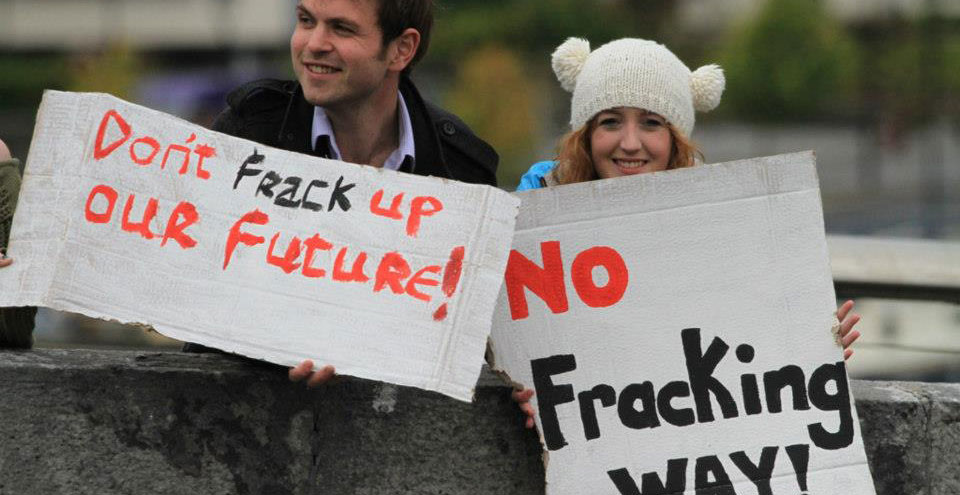As the UN climate negotiations get under way in Bonn, Germany, Jamie Gorman of Young Friends of the Earth Europe gives a quick run down on why the talks are important for the fight against fracking.
United Nations climate negotiations will resume for a ten-day session in Bonn, Germany, from 4-15 of June. The talks in Bonn prepare the ground for discussions by heads-of-state in Lima at the end of this year. They will focus on contributions to the Kyoto agreement, but also on a new agreement for post-2020 climate action, which is expected to be agreed in Paris in 2015.
‘Fracking’ is a process of extracting shale gas or coal bed methane through a dangerous and highly polluting mining process. All over Europe and around the world communities are resisting fracking and calling for sustainable and just alternatives like community owned renewable power.
There are four key reasons why anti-fracking activists should know about the UN climate talks:
1. Fracking and solutions to climate change are not compatible
If governments want to take the urgent challenge of climate change seriously, and reduce emissions in line with science and equity, then fracking is not an option.
Burning more gas, from more and more extreme sources like shale or coal bed methane will prevent governments from meeting targets on emissions reduction. Shale gas and coal bed methane are not “bridging fuels”, as gas industry marketing departments try to convince us. Liquid ‘natural’ gas from fracking needs to be supercooled and liquefied for shipping and the energy needed for that, as well as all the potential leaks from fracking wells, makes the carbon footprint of fracking worse than coal.
As Bill McKibben says “This is not a bridge; it’s just a rickety pier stretching further out into the fossil fuel lake”
2. Strong commitments to action on climate change could prevent fracking
Governments are meeting at the UN climate talks because they urgently need to agree equitable and just actions that tackle climate change. The negotiators have set the target of November 2015 to agree a legally binding agreement on climate change, including emissions reduction targets.
But fracking is a dirty fuel with a high carbon footprint so states cannot frack with one hand and sign this agreement to tackle climate change with the other. Campaigning for our governments to take ambitious action on climate change will also make it harder and harder for them to frack.
3. Fracking distracts us from real solutions to climate change
Fracking is a dirty distraction from what our governments should really be supporting: local communities finding sustainable solutions to their energy needs.
When our governments support fracking they are supporting “business as usual” for the big oil and gas companies. Rather than supporting Big Business, our governments should be supporting our communities to develop community energy projects that put energy in the hands of the people.
4. The disastrous economics of fracking is heightened by climate change
The emissions reductions that governments are urgently required to make in order to prevent runaway climate change means that 80% of estimated fracking reserves will need to remain in the ground. This is known as the ‘unburnable carbon’. Investing in exploring new forms of dirty energy such as fracking simply adds to the unburnable reserves.
If governments are to prevent disastrous climate change then global temperatures will need to stay below 1.5 degrees Celsius. Yet the International Energy Agency predicts that the exploitation of unburnable carbon from shale would put CO2 emissions on a ‘trajectory consistent with a probably temperature rise of more than 3.5 degrees Celsius in the long term’.
The legally binding climate agreement which is expected in 2015 could block governments from being able to exploit shale gas and coal bed methane. Emissions from such extreme fossil fuels could be prevented under the emissions reduction targets of the agreement.
With so much to lose on this speculation game by the gas companies, it’s clear that for every pound invested in fracking this is not only a pound not invested in the real renewable energy solutions that are urgently needed, but triggers billions more of public money in wasted infrastructure.
The cost of inaction and investment in false solutions will be much higher than if we invest now in real solutions such as renewable energies.
The real solutions to climate change includes community renewable energy, emissions reduction and an end to business as usual. Fracking and other forms of dirty energy are not a solution. Anti-fracking campaigners and climate campaigners share a common vision of a just, sustainable and fracking-free future. Working together we can achieve this!
Follow Young Friends of the Earth Europe at the UN climate intersessionals in Bonn for further updates and analysis:
Twitter: @Young_FoEE
Facebook: https://www.facebook.com/YoungFoEE
Blog: http://foeeurope.org/yfoee
Flickr: https://www.flickr.com/people/youngfoee/

